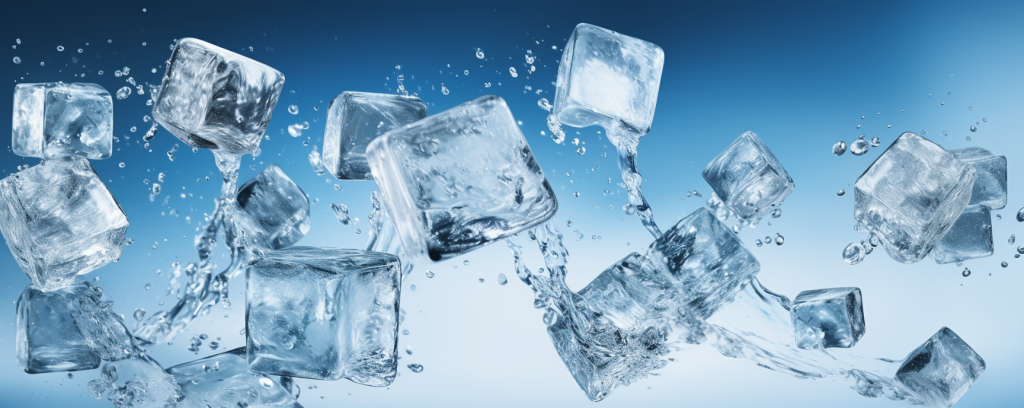You might have heard warnings about chewing ice and your teeth. Is there truth to the concerns? In short, yes—dental professionals agree that the habit can damage your oral health. Without spoiling too much of what’s covered in this article, we’ll explore the potential harms of ice chewing and provide insights into the question, “is chewing ice bad for your teeth?” as well as preserving your dental well-being.
Key Takeaways
- Chewing ice can damage tooth enamel, increasing the risk of enamel erosion, tooth sensitivity, cavities, and cracked or chipped teeth, which may require extensive dental treatments.
- Compulsive ice chewing, known as pagophagia, could be a symptom of iron deficiency anemia or other health conditions. Treatment and addressing underlying issues may reduce the urge to chew ice.
- Preventing and breaking the ice-chewing habit involves finding safe alternatives, such as allowing ice to melt in the mouth, using chew-friendly foods like cucumber slices, and maintaining good dental hygiene.
The Connection Between Chewing Ice and Oral Health
If you are one of the many people who find satisfaction in the crunch of ice between your teeth, you might be causing harm to your oral health. Chewing ice can lead to:
- Enamel erosion
- Heightened tooth sensitivity
- Cavities
- Cracked or chipped teeth
What initiates these problems? Let’s examine the consequences of this cold practice.
Enamel Erosion
Tooth enamel is a hard, protective outer layer that shields our teeth from daily wear and tear. But the habit of ice chewing can cause significant damage to it. The friction and stress from chewing on hard ice cubes can lead to enamel erosion, which is the wearing away of this protective layer, leaving your teeth susceptible to decay. This doesn’t happen overnight, but over time, the constant wear and tear, combined with the cold temperature of the ice, can result in significant enamel loss.
The harm extends beyond this. Erosion of tooth enamel can reveal the succeeding layer of the tooth, known as the dentin. Dentin is more porous and sensitive than enamel and its exposure can increase the risk of cavities. Now, imagine the feeling of biting into an ice cream or sipping a hot drink with a tooth exposed like this. Uncomfortable, isn’t it?
Tooth Sensitivity
When the protective enamel is worn away by chewing ice, the sensitive dentin layer of the tooth is exposed. This could result in enhanced tooth sensitivity, frequently causing a sudden, sharp pain when eating or drinking hot or cold items. The pain can also occur due to the contraction and expansion of dentin in teeth caused by the cold temperature of ice.
Beyond discomfort, tooth sensitivity could also indicate preliminary harm that may result in cavities. When the pain strikes, it’s not just a warning to stay away from that ice cream or hot coffee. It’s a call for help from your teeth, signaling that they are at risk and need attention.
Cavities
Cavities are small holes or openings in the teeth caused by tooth decay. Regular ice chewing can harm the enamel, making your teeth more prone to such decay. The habit can lead to a higher risk of developing cavities, especially if coupled with poor oral hygiene.
The cold temperature of the ice may also contribute to dental problems. The sudden change in temperature can cause the dentin in your teeth to contract and expand, which can lead to sensitivity and discomfort. These signs could indicate potential harm that might ultimately result in cavities.
Cracked or Chipped Teeth
 In addition to causing cavities and sensitive teeth, chewing ice can also lead to more visible damage: cracked or chipped teeth. This happens as ice is solid, and the force applied by your teeth while crushing it can cause them to fracture or chip.
In addition to causing cavities and sensitive teeth, chewing ice can also lead to more visible damage: cracked or chipped teeth. This happens as ice is solid, and the force applied by your teeth while crushing it can cause them to fracture or chip.
Once a tooth is cracked or chipped, it would require dental intervention for repair. Depending on the extent of the damage, treatments can range from:
- Simple dental bonding
- Crowns
- Veneers
- Root canals
Imagine all of this, just because of chewing on ice, a few ice cubes! It’s surprising how something as simple as deciding to eat ice or enjoy some shaved ice can lead to such consequences, even when dealing with a single ice cube.
Pagophagia: The Compulsion to Chew Ice
While some people chew ice out of habit or to cool down, others may do it compulsively. This is known as pagophagia, a form of pica—an eating disorder characterized by the consumption of items with no nutritional value. Pagophagia is often associated with iron deficiency anemia and other underlying health conditions.
Iron Deficiency Anemia
Iron deficiency anemia is a condition where your body lacks enough healthy red blood cells to carry oxygen to your tissues, making you feel tired and weak. It’s not entirely understood why, but many people with this form of anemia report a craving for ice. This compulsion often subsides when their iron levels are restored.
Diagnosing iron deficiency anemia involves blood tests to evaluate the size and color of red blood cells, as well as their capacity to carry oxygen. If you’ve been chewing ice and experiencing symptoms of anemia, such as fatigue, weakness, or shortness of breath, it’s worth discussing with your doctor.
Other Causes of Pagophagia
While iron deficiency is a common cause, pagophagia can also be linked to other conditions. For instance, low calcium can be a contributing factor. It is also often observed in individuals diagnosed with eating disorders like anorexia nervosa and bulimia nervosa.
Furthermore, pagophagia may be related to mental health conditions such as obsessive-compulsive disorder, depression, autism spectrum disorder, stress, and anxiety. These conditions may prompt individuals to chew ice as a way to cope with emotional stress. Certain groups, including pre-menopausal females, school-aged children, and those with developmental disabilities, are more susceptible to this behavior.
Tips for Breaking the Ice Chewing Habit
Breaking the ice-chewing habit is not an overnight process. It often involves addressing any underlying health issues, such as dry mouth, finding safe alternatives, and practicing good dental hygiene.
Let’s tackle it step-by-step.
Identifying Underlying Health Issues
The initial move towards stopping the compulsive ice chewing habit involves recognising and managing any latent health issues. The crave ice may be a sign of a physical or mental health condition, such as pagophagia or iron deficiency anemia. Therefore, if you find yourself constantly craving ice, it might be worth getting checked for iron deficiency anemia.
Apart from anemia, pagophagia may also signal other nutritional deficiencies or medical conditions. If your diagnosis of anemia has led to a reduction in your ice cravings post-treatment, it might signify that your ice-chewing habit was a symptom of the ailment.
Safe Alternatives to Chewing Ice
As you lessen your ice chewing, finding safe substitutes to meet your cravings could be beneficial. For instance, you can allow ice cubes to slowly melt in your mouth, providing similar cold relief without the potential damage caused by chewing. Other alternatives could include cold beverages such as coffee, tea, flavored water, smoothies, vegetable juice, and coconut water.
If you still miss the crunch, try swapping your ice cubes with chilled cucumber slices, carrot sticks, or apples. These offer a refreshing alternative, providing the desired crunch and coolness without the potential risks associated with chewing ice.
Dental Care and Prevention
Preserving optimal dental hygiene is a vital aspect of controlling the impact of ice chewing. Regular brushing, flossing, and using mouthwash can help keep your teeth and gums healthy. If you’ve been chewing ice frequently, it’s also wise to schedule regular dental check-ups to monitor your oral health.
In addition to proper hygiene, preventing further damage is also important. Consider replacing ice with softer alternatives or allowing it to melt in your mouth rather than chewing it. Using remineralizing toothpastes and those containing fluoride can also assist in fortifying your enamel.
Consequences of Untreated Ice Chewing
If left unchecked, the habit of chewing ice can lead to serious consequences, both for your dental health and overall well-being, making eating ice bad for you.
Let’s explore the possible complications resulting from unchecked ice chewing.
Dental Complications
Unchecked ice chewing can result in serious dental problems, including:
- Tooth decay
- Cavities
- Chipped or broken fillings and crowns
- Damage to tooth enamel
This can cause serious discomfort and may require costly dental procedures to repair.
More than just a cosmetic issue, cracked or chipped teeth can also lead to other dental problems. For instance, the trauma can damage the gum tissue and numb the gums, increasing the risk of gum disease. Moreover, the habit could also cause or worsen temporomandibular joint disorders (TMJ or TMD), which can result in further dental complications.
Anemia-Related Health Problems
Beyond dental issues, unchecked ice chewing, especially when it involves pagophagia, can result in anemia-related health problems. Prolonged untreated pagophagia can contribute to the development of anemia, particularly iron deficiency anemia, as the body tries to increase iron levels.
Iron deficiency anemia is typically associated with fatigue and weakness. However, if left untreated, it can also lead to more serious complications. For instance, during pregnancy, it can increase the risk of low birth weight, premature birth, and developmental delays in the baby.
Dr. Joan Greco brings a wealth of expertise and experience to patients seeking All on X dental implants in Hawaii. With advanced training and a deep understanding of oral surgery, prosthodontics, and implantology, Dr. Greco is known for her meticulous approach and commitment to patient care. Her comprehensive knowledge allows her to tailor treatment plans to individual needs, ensuring optimal outcomes and patient satisfaction. Dr. Greco’s skillful application of the all-on-4 technique enables patients to regain full dental function and a confident smile, enhancing their quality of life with long-lasting results in the beautiful backdrop of Hawaii.
Frequently Asked Questions
What happens if you chew ice everyday?
Chewing ice everyday can lead to tiny cracks in your tooth enamel due to its brittle texture and extremely cold temperature, which can weaken your teeth over time.
Does chewing ice damage teeth?
Chewing ice can cause significant damage to your teeth, including chips, cracks, and increased sensitivity to hot and cold. It can also make you more prone to tooth decay and cavities.
How do I stop chewing ice?
To stop chewing ice, try replacing it with baby carrots or apple slices for the crunch, and let the ice melt on your tongue rather than crunching it. Keeping a water bottle in the fridge can also help satisfy the craving.
Why do I crave ice?
Craving ice, known as pagophagia, may be a symptom of iron deficiency anemia, specifically a condition called pica. Pica is characterized by cravings for items with no nutritional value, such as ice. Always consult a healthcare professional if you have concerns about your cravings.
What does eating ice do to your body?
Eating ice can cause tiny cracks in your tooth enamel, leading to potential dental problems. It’s best to avoid chewing on ice to protect your teeth.

